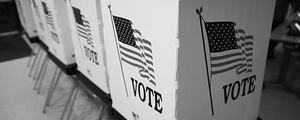What will determine voters' choice for president this year? Political scientists tell us that party loyalty, candidate images and personalities, and other idiosyncratic factors play a significant part in our vote. The main, overt focus of the presidential campaigns, however, is on none of the above -- but instead is overwhelmingly on policies and issues. Presidential debates, campaign websites and candidate speeches mostly consist of nuanced and often highly specific discussions of how each candidate would address a long list of issues and solutions to pressing problems.
This raises the question: Which of all possible issues and policies are going to end up being the most important to Americans as the 2020 election approaches?
My colleague Zach Hrynowski recently helped answer that question. He reviewed the public's responses to a Gallup question asking Americans to rate how important a series of issues will be in influencing their vote for president. We've asked this question many times before; this time, the list included 16 issues.
Zach's review shows that Americans tend to think most of the issues are going to be important to their vote, with a majority rating all issues but one as at least "very important." But Americans tend to pull back from saying these issues will be extremely important to their vote. Just 35% say healthcare is extremely important, at the top of the list, and the "extremely important" percentage for each other issue goes down from there.
These two ratings (the "extremely important" percentage and the "extremely + very important" percentage) provide us with two distinct types of information. The first measures the degree to which an issue generates intense concern, while the second measures the issue's broader -- but shallower -- importance.
And there is more! We can add in another way of looking at issue salience -- the responses each month to our question asking Americans to name, off the top of their head, the most important problem facing the nation. (My colleague Lydia Saad recently provided an in-depth review of these responses for 2019.)
So we have the broad importance of issues as measured by the percentage who say an issue is at least very important (a fairly low threshold), intense importance as measured by the percentage who say an issue is extremely important and top-of-mind salience as measured by mentions in the "most important problem" question.
Looking across these measures, there are three topics (of those included in the list in our December survey) that I would call A-list issues. These are healthcare, the economy and immigration. These issues were mentioned by 5% or more of Americans (without prompting) as the most important problem facing the nation in our latest survey, had a 28% or higher "extremely important" rating and were rated as extremely or very important by more than 70% of Americans. No candidate can go wrong discussing these issues.
There is a second group of issues that I would call fundamental, universal or basic societal needs (nomenclature borrowed from Abraham Maslow's hierarchy of needs work in psychology) -- issues that are rated as broadly important but are not highly top of mind. Americans may not think of these issues straightaway because they are so basic -- like having air to breathe, water to drink, food to eat and some form of shelter. But when prompted, Americans clearly perceive their importance. These issues include terrorism/national security, infrastructure and education. Gun policy, although seemingly not the same type of issue conceptually, also fits the criteria of being seen as broadly important but not highly top of mind.
I classify four other issues as niche issues, those that are not seen as broadly important (based on the percentage who rate them as extremely or very important) but that are above average in terms of top-of-mind mentions or that have a high "extremely important" rating. These issues are climate change, income inequality, race relations and abortion. These issues are important to some segments of the population but don't have broad importance to the larger mass.
Finally, four of the issues tested are off the radar -- not broadly important to most Americans, intensely important only to a relatively small group and not top of mind. These include taxes, foreign affairs, trade and LGBT rights.
Partisan Differences
Of course, one of the reasons why some issues don't have high "extremely important" scores (and high top-of-mind scores) among the general public is that their importance is high only to those who identify with one or the other major party groups in American society. In his review, Zach shows how Republicans this year tend to rate most of the issues as less important than do Democrats, a phenomenon related to the fact that a Republican president currently sits in the White House. This is not new; as Zach shows, the importance of issues usually tends to be lower for partisans when their party controls the presidency. At this juncture, Republicans presumably give issues lower importance ratings because they are happy to be voting for the incumbent and -- compared with Democrats -- don't have to expend cognitive effort to figure out what candidates' positions are. They have only one candidate in mind and are pretty much going to vote for that person regardless.
All in all, the top five issues for Democrats, based just on the "extremely important" rating, are healthcare, gun policy, climate change, education and income inequality. We have seen most of these issues addressed in the Democratic debates. For Republicans, the top issues are terrorism/national security, the economy, immigration, abortion and gun policy.
The Elephant in the Room
The December Gallup survey list of election issues didn't include any related directly to the way government functions. But, in response to our "most important problem" question, more Americans volunteer some aspect of the government as the top issue facing the nation than any other issue -- as has largely been the case for years. This "government" category includes specific complaints about Donald Trump, about congressional Democrats, about the whole process of how government works and about government not getting anything done.
Of course, "government" is not a policy issue per se, but rather a broader focus on the entity in charge of prioritizing and executing policies. But the way government is operating is clearly a huge concern to voters, as I have discussed at some length, and is an overriding concern that no candidate can (or should) ignore. Proposing specific healthcare or immigration policies is fine as far as it goes, but if the government can't function, these policies are going nowhere.
It is often said that venture capitalists are more interested in the background, experience and expertise of the management of a proposed startup than they are in the specific business niche or idea behind the company. These investors presumably know that no idea or business plan is worth much if it can't be properly executed. In similar ways, I think the public is telling us that -- in addition to the policies and issues that concern them -- elected officials' first task is to be able to work together, compromise and manage government bureaucracies.
All in All: Advice to the Presidential Candidates, From the People
Based on available data, and assuming a need to address the concerns of the country as a whole rather than more narrow partisan bases, presidential candidates should focus first on healthcare, the economy and immigration, along with specific proposals for addressing dysfunctional government. Candidates should also, as a matter of course, address how they are going to "keep the trains running on time" -- keeping the nation secure and defended from external threats, educating the country's citizens, maintaining and upgrading the backbone of the nation's infrastructure, and doing something about guns and gun violence.
Several issues such as climate change, income inequality, race relations and abortion are important to significant segments of Americans, but at this juncture do not generate the high levels of concern from the overall population that are attached to the others.
Learn more about public opinion metrics that matter for the 2020 presidential election at Gallup's 2020 Presidential Election Center.




